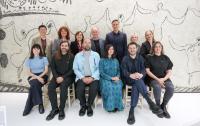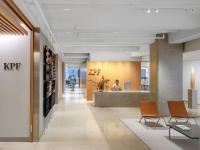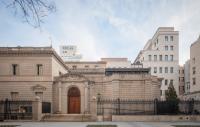The Cradle
Düsseldorf, Germany
Identity-forming and circular: The Cradle adds a healthy building to the striking architectural diversity in Düsseldorf's Media Harbour - and not just for the diverse tenants
Breaking away from old conventions, breaking new ground in architecture and developing circular solutions - that was the goal that the integral planning team set itself for The Cradle from the outset. ‘In 2017, many of the foundations for circular construction were not yet in place. The client Interboden, the specialist planners involved and we as architects embarked on a journey during the particularly intensive collaboration to explore new solutions. Always with the aim of realising a circular pilot project in mind,’ explains Antonino Vultaggio, Senior Partner at HPP Architekten.
The Cradle was completed in December 2023 and is now occupied. One special feature is its exposed location: the office building was erected on what was then the last plot of land on the waterfront on Speditionstrasse in Düsseldorf's Medienhafen. Today, the building is characterised by a particularly high level of material health and inspiring spaces for users and visitors. The mix of materials used for the façade - wood, glass and concrete - and the identity-forming V-shaped columns, which frame the view of the surroundings and allow users to exit the building at any time, lend the interior an impressive atmosphere. Thanks to the filtering and regulating properties of the wood and floor-to-ceiling green walls, users in the offices benefit from a good indoor climate, which can be beneficial to the health of asthmatics and allergy sufferers in particular. The ground floor houses publicly accessible areas, such as co-working spaces from Spaces and the Hato restaurant with an outdoor terrace facing the water. Design is combined with culinary delights here - not just for building users, but for the entire neighbourhood. ‘The Cradle will hold a special place among the lighthouse projects for a long time to come,’ says Carsten Boell, Managing Director of The Cradle GmbH & Co. KG.
The Cradle closes the circle sustainably
Circular construction is based on the idea that as few raw materials as possible should be thrown away, but that everything built can be reused in ever new cycles. In line with the Cradle to Cradle® principle, The Cradle acts as a material store and is therefore particularly sustainable in its design. This is because all built-in materials have been tested with regard to material health, freedom from harmful substances and subsequent dismantling of the individual components. The diamond-shaped timber façade was developed from the location and integrally combines the supporting structure, sun protection and loggias through its design. The façade is also an expression of recyclability, as the elemental V-supports made of larch wood follow the concept of ‘design for disassembly’. A total of 2,150 m3 of wood from certified sustainable European, mostly German, forestry was used. As a renewable material, wood replaces the environmentally harmful building material concrete wherever possible, stores carbon and thus improves the building's carbon footprint.
Innovation and added value in all areas
Spaces moved into the building in January 2024 and offers freelancers and start-ups a flexible and productivity-enhancing working environment. ‘Our customers come to this new location very consciously, because The Cradle is one of the most characteristic buildings in the Media Harbour and exudes an all-round creative spirit. Working right on the waterfront with a view of the marina - that's what makes this co-working location so unique for them,’ says Stine Leidel, City Manager at Spaces. The Cradle has its very own architectural charm and is the best example of how circular construction is already possible in practice today. Socially as well as ecologically and in terms of building culture. The Circularity Passport® - the planning and documentation tool for calculating circularity - provides information on this: At The Cradle, material health was improved by 56% and the CO2 footprint by 50% compared to standard buildings, among other things.
- Architects
- HPP Architects
- Location
- Düsseldorf, Germany
- Year
- 2023
- Client
- INTERBODEN
- Rental Area
- 6,600 m²
- Awards
- MIPIM/The Architectural Review Future Project Award 2018, ICONIC AWARD: Innovative Architecture 2018













